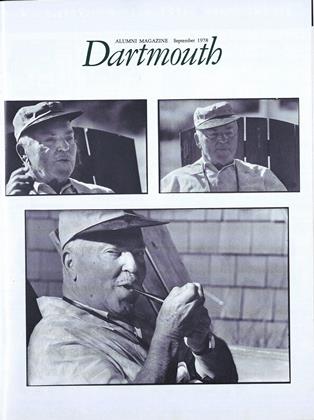The one point on which there is no confusion is that there is confusion about the Supreme Court decision - or nondecision - in the Bakke Case.
The day after the opinions were handed down, President Kemeny stated officially that "Dartmouth will not have to change its admissions policies." In fact, he added, "I could go so far as to say that Justice Powell in describing the kind of admissions process that he would find totally acceptable and reasonable could well have been talking about the Dartmouth system."
Nevertheless, in late July, a group of well-informed College officials got together for a panel discussion on the implications and potential effects of the case. Moderated by Jonathan Brownell, director of the sponsoring Public Affairs Center, the panel appropriately enough included three white male lawyers, the chairmen of Black Studies and Native American Studies, and the woman who chairs the Affirmative Action Review Board. No rigid quotas, mind you, just a collection of people representative of the diversity of the College.
Words like "ambiguity," "confusion," "obfuscation," and "non-opinion," abounded. College Counsel Cary Clark '62 led off with a review of the six opinions - "it would be difficult to conclude what at least five of them said about anything" - got in a good pitch for the Equal Rights Amendment, and concluded with an open invitation to read the documents and "if you understand them, drop me a note."
Physiology Professor Hilda Sokol found the decision "in general a positive one: Bakke won, but so did most affirmative action programs," but she's concerned that "while committed institutions will emphasize the positive aspects, others may find in it good reasons" for backing off.
Historian Michael Green of Native American Studies, noting the nation's "legacy of active and passive discrimination," suggested that it is irrational to argue "that racial problems can't have racial solutions." He saw the decision as "a signal to retrench" and predicted "shrinking educational opportunities for minorities."
To Black Studies Chairman William Cook, Bakke was "a political decision, with very little to do with law," but a typically American decision. Brown v. Board of Education was a freak, he said, based on Camelot-type myths of "the miracle land of freedom." Now the bottom line, he said, is a game of "equal, equal, ready or not"; with blacks declared "unofficially equal" by the Brown decision, why should they need more?
Government Professor Vincent Starzinger saw the most significant implication in "the meaning of the key word, equality," a concept that has "in the wake of Bakke become more elusive than ever." He found "very provocative" Justice Blackmun's opinion that "in order to treat some persons equally, we must treat them differently." Bakke may in the end, he suggested, lead to a reinforcement of quotas and a "neo-feudalism" growing out of government "interpenetration" between the public and private groups. "We may have left a color-blind constitution behind us," he warned.
While Bakke may mean something to all of the people some of the time or to some of the people all of the time, it seems to mean the same thing to no two of the people any of the time.
 View Full Issue
View Full Issue
More From This Issue
-
 Feature
FeatureA Company of Stretchers
September 1978 By Cay Wieboldt -
 Feature
FeaturePoet at Full Ahead
September 1978 By Charles G. Bolte -
 Feature
FeatureTHE RIVER and THE DAMS
September 1978 -
 Article
ArticleA Journey: Five days to Big Rapids
September 1978 By Dan Nelson -
 Article
ArticleDickey-Lincoln: Who wants it? Who needs it?
September 1978 By Greg Hines -
 Article
Article'A Spirit of Fire and Air'
September 1978 By NARDI REEDER CAMPION







